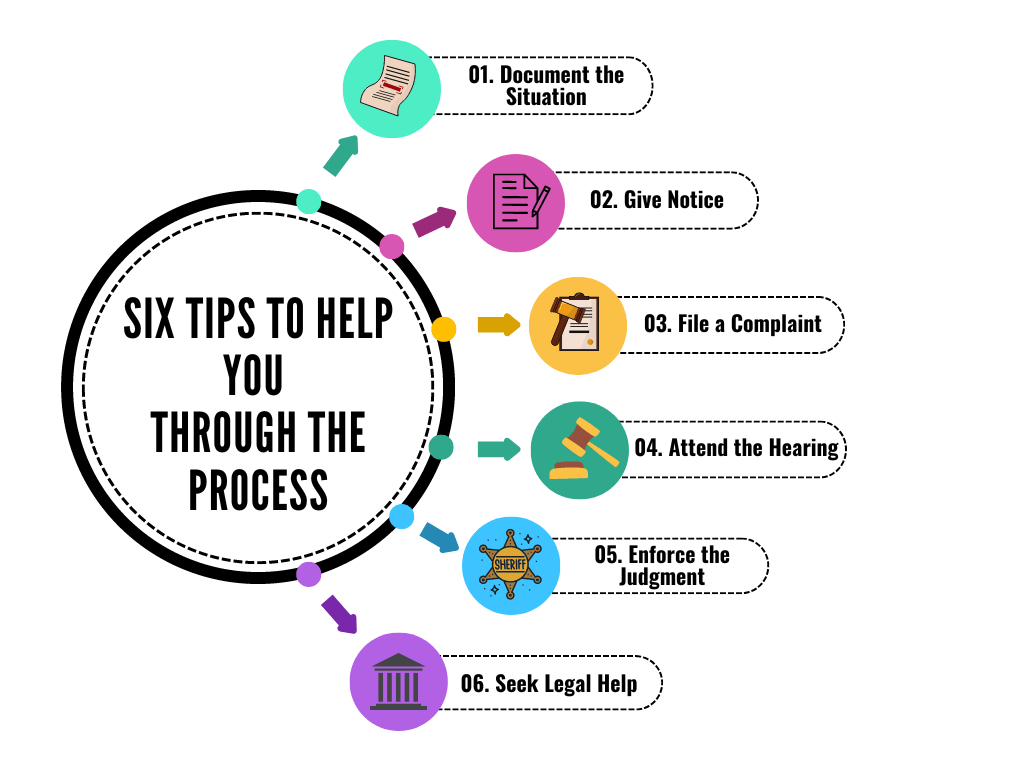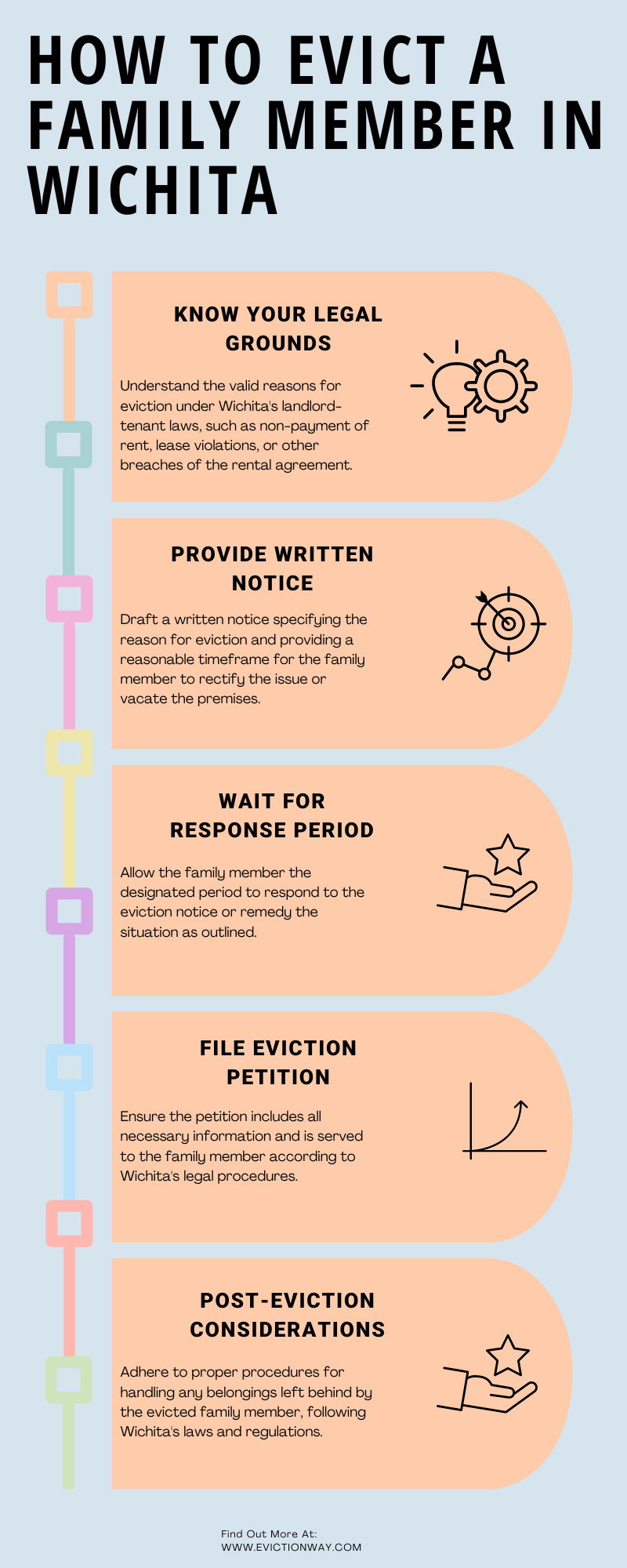Evicting a family member can be a difficult and emotional process, but it may be necessary to protect your rights and property. If you’re facing this situation in Wichita, this blog article will guide you through the steps involved.
We’ll provide you with the best way to evict a family member in Wichita, including the legal process and practical tips. We’ll also share advice on how to remove a family member politely and respectfully, minimizing the impact on your relationship.
In addition, we’ll cover the laws involved in evicting a family member in Wichita, including any special protections that may apply. By understanding your rights and responsibilities, you can navigate this challenging process with confidence.

How To Evict a Family Member In Wichita
Evicting a family member can be a difficult and emotional process, but it is sometimes necessary to protect your rights and property. If you are considering evicting a family member, it is important to understand the legal process and your rights as a landlord.
1. Document the Situation
The first step in evicting a family member is to document the situation. This includes keeping a record of any rent payments that are missed, any lease violations, and any other problems that you have with the tenant. It is also important to keep a record of any communication that you have with the tenant, such as emails, text messages, and phone calls.
2. Give Notice
Once you have documented the situation, you need to give the tenant notice to vacate the property. The notice period will vary depending on the type of tenancy and the laws in your state. In Wichita, the notice period is typically 30 days.

3. File a Complaint
If the tenant does not vacate the property after the notice period has expired, you will need to file a complaint with the court. The complaint should state the grounds for eviction and the amount of rent that is owed.
4. Attend the Hearing
Once you have filed a complaint, you will need to attend a hearing in court. At the hearing, you will have the opportunity to present your case and the tenant will have the opportunity to present their case. The judge will then make a decision about whether or not to evict the tenant.
5. Enforce the Judgment
If the judge rules in your favor, you will need to enforce the judgment. This may involve obtaining a writ of possession from the court. The writ of possession will give the sheriff the authority to remove the tenant from the property.
6. Seek Legal Help
Evicting a family member can be a complex and challenging process. It is important to seek legal help if you are considering evicting a family member. An attorney can help you understand the legal process and your rights as a landlord.

How Much Does it Cost to Evict a Family Member in Wichita?
The cost of evicting a family member in Wichita can vary depending on the specific circumstances of the case. However, there are some general costs that you can expect to incur. These costs include:
| Cost Category | Potential Expense (USD) | Notes |
|---|---|---|
| Filing Fee for Eviction | $50 – $150 | Depending on the court’s schedule of fees. |
| Legal Consultation/Attorney’s Fees | $100 – $300/hr | Can vary widely based on the attorney’s experience. |
| Service of Process | $35 – $100 | Fee for serving eviction notice to the tenant. |
| Court Appearances | $0 – $500 | Some trials may require no fee; others have costs. |
| Lost Rent (Opportunity Cost) | Variable | Cost of unpaid rent during the eviction process. |
| Locksmith (to change locks) | $75 – $200 | This is sometimes done after an eviction. |
| Storage Costs (if applicable) | Variable | If property must be stored as a result of eviction. |
| Damage Repairs | Variable | If there is damage to the property needing repair. |
- Filing fees: The filing fee for an eviction lawsuit in Wichita is $150.
- Service of process: The cost of serving the eviction notice to the tenant can vary depending on the method of service.
- Attorney fees: If you hire an attorney to represent you in the eviction process, you will need to pay their fees.
- Court costs: If the case goes to trial, you may be responsible for paying court costs.The total cost of evicting a family member in Wichita will vary depending on the specific circumstances of the case. However, you can expect to pay at least a few hundred dollars.
FAQs: Evicting a Family Member in Wichita
Here are some of the most frequently asked questions about evicting a family member in Wichita:
What are the legal grounds for evicting a family member in Wichita?
In Wichita, you can evict a family member if they have violated the terms of their tenancy, such as not paying rent or causing damage to the property. You can also evict a family member if they are engaging in illegal activities or if they are a danger to you or other tenants.
What is the process for evicting a family member in Wichita?
The process for evicting a family member in Wichita is similar to the process for evicting any other tenant. You must first give the family member a written notice to vacate the property. The notice must state the reason for the eviction and the date by which the family member must vacate the property. If the family member does not vacate the property by the deadline, you can file an eviction lawsuit with the court.
How can I get help with evicting a family member in Wichita?
There are several resources available to help you with evicting a family member in Wichita. You can contact the Wichita Bar Association for a referral to an attorney who specializes in landlord-tenant law. You can also contact the Kansas Legal Services Association for free or low-cost legal assistance.
How long does the eviction process take in Kansas?
| Action | Duration |
|---|---|
| Eviction notice period | 3-30 days |
| Tenant response period | 14 days |
| Eviction hearing | 3-14 days after service of summons |
| Landlord reply to counterclaim | 14 days |
| Service of writ of restitution | Within 14 days |
| Storage of tenant belongings | 30 days |
| Total | 3 weeks to 3 months |
How do I evict someone without a lease in Wichita, Kansas?
In Kansas, even without a formal lease, tenants become month-to-month renters. To evict them, you can follow these steps:
- Give the tenant a 30-day notice: This written notice should inform them that you want to terminate the tenancy and they have 30 days to move out.
- If they don’t leave after 30 days, you can file an eviction lawsuit in court.
What are some tips for evicting a family member in Wichita?
Here are some tips for evicting a family member in Wichita:
- Document everything: Keep a record of all communications with the family member, including any notices to vacate and any attempts to resolve the issue.
- Be prepared to go to court: If the family member does not vacate the property by the deadline, you will need to file an eviction lawsuit with the court.
- Be patient: The eviction process can take time, so be patient and don’t give up.
What are some common mistakes to avoid when evicting a family member in Wichita?
Here are some common mistakes to avoid when evicting a family member in Wichita:
- Don’t try to evict the family member without giving them a written notice to vacate.
- Don’t try to evict the family member without going through the court process.
- Don’t try to evict the family member using force or violence.
Related:
